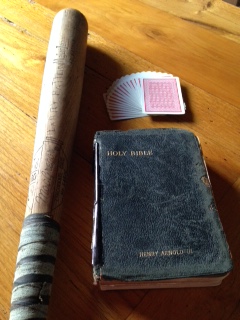Baseball, Bible, and Betting
I have no fondness for alliteration. If I use the literary device it is either because I have no other words at my command to make the point, or my editorial skills were distracted at the moment I came up with the offending passage. It is not that I am anti-alliteration. Authors I admire have used the stylistic device to great effect: Poe, Coleridge, Frost, and Whitman, to name a few. It can be very effective in speeches. But on the whole, I try to stay away from its use. However, in the case of the title of this post, the alliterate use of these three B’s represent a seminal moment in my life many years ago; and it is this time of year when our attention becomes focused on the baseball playoffs and which two teams will make it to the World Series, that I’m reminded how our National Pastime, laying a wager, and Holy Writ converged in the blink of an eye to bring my world crashing down upon me.
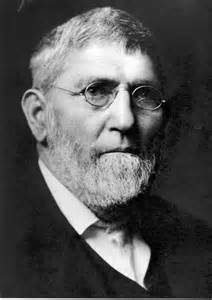
It was October, 1967. I was a senior at David Lipscomb High School. Minister and educator, David Lipscomb, founded Nashville Bible School in 1891. Years later the institution was renamed after its founder, and over the decades, it has expanded its educational web to encompass (yes, I just used an alliterative triple E) curriculum for grades kindergarten through high school, a four-year college, and multiple post-graduate programs. While much has changed, one foundational principal that has remained a “was, is, and always shall be” constant, are the required Bible classes for the students.
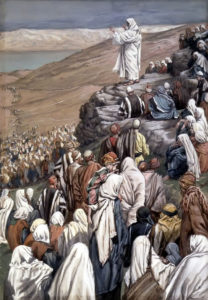
It was in one of those Bible classes on that inauspicious day in October we high school seniors found ourselves pouring over the famous “Sermon on the Mount.” The passage from the Gospel of Matthew was our focus of study, and for our mid-semester final we were to memorize and write the three-chapter sermon—King James Version, of course, the “If it’s good enough for the apostle Paul…,” translation. The teacher was called away from class, but before his departure, he admonished us to use this time to memorize and meditate on the words of our Lord. Many remained in pious reflection during the teacher’s long absence, but some of us yielded to the temptation of worldly interests. The whispered conversation originated from a cluster of desks in a corner, and like a slow moving current, flowed out into the room. The topic was the World Series between the Boston Red Sox and the St. Louis Cardinals, not the Beatitudes.
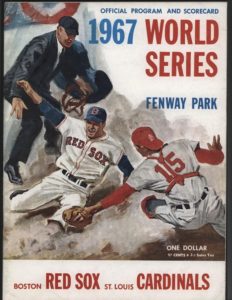
The debaters were evenly divided about which team would win the seventh and final game rating their chances on the strengths and weaknesses of each team’s roster. Finally, one ardent defender of his team challenged a counterpart for the other team to “put his money where his mouth was,” and as fast as old west gunslingers, out came their wallets. A chain reaction ensued and cash began appearing on the desk centrally located to the heated debate…mine. The fact that I had had a paper route and knew how to keep payment records for hundreds of customers, got me the job as the accountant for all placed bets with corresponding names. Another boy kept the money, one from a wealthy family who would not be tempted to skim off the top.
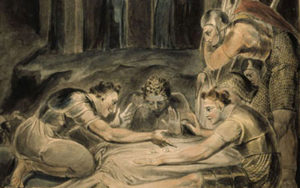
I was the victim of the capriciousness of Fate, and while not being a Bible scholar, I reasoned there was biblical precedent: did not Jesus’ disciples cast lots to replace Judas? Word spread like the proverbial wildfire, and between class periods, transactions were conducted in the bathrooms, around the lockers, at the lunch tables; all team preferences whispered and meticulously recorded in my notebook and all money surreptitiously slipped into the “banker’s” hands. By fifth period study hall I had accrued an impressive list of names: upper and lower classmates, athletes and scholars, teacher’s pets and those consigned to the back rows, paragons of virtue and the socially dysfunctional, we were all of one mind and accord. This sudden gambling fever had infected our collective moral character and unified us in this spiritual deprivation.
A self-appointed, “Professor” Harold Hill type, concerned, no doubt, about this en masse spiritual malady, blew the whistle, and I was busted while updating the accounts with all the bettors names. Lulled by the thrill of gambling, I had dismissed the prospect of the powers-that-be discovering our syndicate, forgetting about their effective omniscience and omnipresence followed naturally by omnipotence (There I go again with a triple “omni” O). Like an F.B.I. raid rounding up unsuspecting Mafia felons, students were gathered from the classrooms and herded to the principal’s office. The expulsion of all the bettors made the front pages of both daily papers and the television evening news. The sound of “weeping and wailing and gnashing of teeth,” could be heard throughout the land from the households of those whose darling had been consigned a place with the damned, mine included. But in the course of time cooler heads prevailed and someone actually read the Student Handbook which stated that gambling was an offense worthy only of suspension not expulsion. After a marathon of parent/teacher conferences and student repentance’s, all pupils were restored to their place among the righteous, myself included.
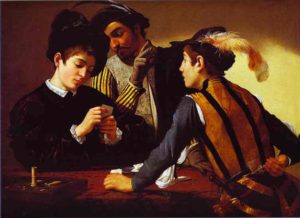
To say our contemporary culture (religious and secular) has changed its views on gambling since that day would be an understatement. While I have not succumbed to the myriad gaming options available to drain my bank account, I do meet regularly with some of my buddies in the film business for a night of Texas Hold’em (sans the Renaissance costumes and obvious cheating as pictured in the painting). I have yet to prevail in the winner-take-all pot; perhaps my just desserts for contributing to the downfall of so many young men long ago.
Some forty-eight years after the gambling fiasco, I was given a special bit of grace when I was contacted by the chairman of the performing arts department of Lipscomb University at the behest of its president, Dr. Randy Lowry. Full disclosure: Randy and his wife, Rhonda, have been long-time friends. We attended Pepperdine University together in the early 1970’s. The request was for me to play the role of the founding father himself, David Lipscomb, for some on-camera vignettes and then to do a live presentation with Randy on stage in front of thousands of people for their big Founder’s Day celebration. And they were paying me too, an offer I couldn’t refuse. We shot the segments the day before the live event so the producers could edit the footage for a montage that would be shown during my time on stage with Randy. Through the miracle of science and technology, David Lipscomb was brought back to the future. The crew filmed David Lipscomb wandering the campus marveling at all the changes that had taken place since his day.
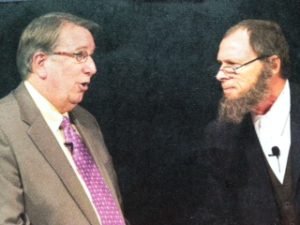
A few moments before the live event, I was backstage studying the script. Randy and I had already done a quick run-through that morning. Before the show, Randy came around behind the curtain to check on me. It was just the two of us, and in a quiet but jovial moment, he threw his arm around me, and asked if the rumors he had heard about my brief dalliance with gambling in high school and its severe consequences was true. When I confirmed the veracity of the story, he burst out laughing and said, “Well, you know, today we would call that having an entrepreneurial spirit.”
Yes, the times they are a-changin’. Absolution from the president of the University and a pay check. And as icing on the cake, I was invited by the chairman of the performing arts department at Lipscomb University to play the role of Atticus Finch in a production of “To Kill a Mockingbird” for the 2016 Christian Scholar’s Conference. What an honor to be able to do that role on that stage for that university where my father directed, performed, and taught laying the foundation for the tremendous theatre department that exists there today. That is a full-circle story epitomizing God’s grace and good humor. (Triple G. Oh thou hypocrite)
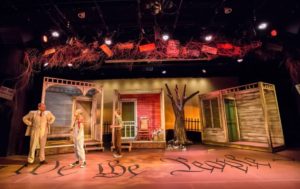
My grandfather used to say that if each of us knew our personal future none of us would choose to walk its path. It is a good thing we don’t know what lies ahead, but if you live long enough and spend time reflecting, you begin to see the mysterious ways of providence and how fortunate it is not to be judged by one particular choice or decision, but more for the summation of choices and decisions, which one hopes, on the whole, lean toward the admirable and the improvement of the world.

